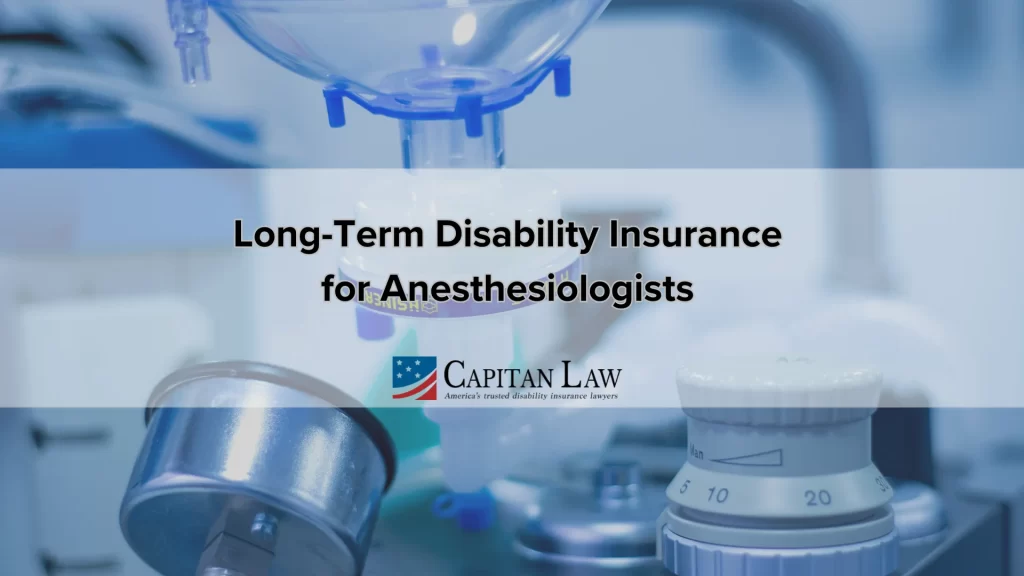
Long-Term Disability Insurance for Anesthesiologists
Anesthesiologists administer pain medication to surgical patients. They must perform the job with such precision that the smallest mistake could be devastating. Anesthesiologists have to be aware of the slightest change in the surgical patient. They can’t get distracted and must be capable during the surgery without making errors.
If an anesthesiologist has any physical or cognitive impairments, the health of their patients could be at risk. Anesthesiologists must file for long-term disability benefits when they cannot perform their jobs due to disability. These benefits help anesthesiologists support themselves if they need time away from work.
If you are an anesthesiologist and have questions about your long-term disability insurance, speak to the occupational disability lawyers at Capitan Law today.
Types of Disabilities That Affect Anesthesiologists
Any branch of the medical profession has its stressors that can lead to a doctor applying for long-term disability, and this includes anesthesiologists. Not only do they need to be aware, but they need to have focus. Also, they need to be fit as the job may entail standing for long periods. Some of the disabilities that affect anesthesiologists are:
- Impairment of Cognitive Abilities
- Severe stress due to anxiety and depression
- Back pain from standing too long during surgeries
- Loss of vision from eyestrain.
You don’t have to become injured during the workday to file for long-term disability claims. If you become injured or ill while not at work, you can still get benefits from long-term disability insurance.
“Own Occupation” v. “Any Occupation” Standards in Long-Term Disability Policies
With long-term disability insurance plans, there are two standards of disability: the “own occupation” standard and the “any occupation” standard. It is essential to understand the difference between the two standards when purchasing long-term disability insurance. When you file a claim, the insurance company will first look at the “own occupation” standard, then the “any occupation.”
“Own Occupation” – If a person can’t perform their work duties because of their disability, they are usually considered disabled under this standard. For anesthesiologists to succeed in their claim for “own occupation” disability, they must prove why their disability makes it impossible to perform their jobs.
“Any Occupation” – This long-term disability standard is harder to prove. Under this standard, you need to prove that you cannot perform at any job for which you would earn a certain percentage of what you earned before you became disabled. To prove this type of claim, you will need to provide vocational evidence of your disability.
You should check your policy to see which type of benefits you have. If you become injured and need to file a claim for long-term disability insurance, have evidence to back up your claim. Your insurance company will want proof of your disability to move your claim forward.
 Denial of Long-Term Disability Claims
Denial of Long-Term Disability Claims
It is important to remember that insurance companies are not on your side and are in the business of making money. They will do anything they can to deny your long-term disability claim. There are many reasons why insurance companies deny claims. Here are some of the more popular ones:
- The insurance policy definition of disability is not met – This goes to the “Own Occupation” and “Any Occupation” discussion above. The insurance company could deny your claim because they believe you are not disabled as defined in the policy.
- Not enough evidence – When you file a claim for long-term disability benefits, insurance companies want medical proof of your disability. The insurance company may only accept a claim if you have submitted enough evidence.
- The policy does not cover your injury – Some long-term disability policies will not cover certain illnesses. Some do not cover drug or alcohol abuse, and most will not cover pre-existing conditions.
- Missed filing deadlines – When you file a claim, you must submit all documents on time, or the insurance company may deny your claim. If they deny your claim, you have 180 days to file a claim.
- Administrative error – Insurance is a paperwork-heavy industry, and errors can occur. The claims adjuster who looked at your case is new to the profession or the company, and they made a mistake. If it is an obvious mistake, the insurance company will fix it for you.
These are some reasons why insurance companies deny claims made by injured anesthesiologists. Insurance companies will come up with creative ideas to deny your long-term disability claim. If an insurance company denies your claim, you should seek an experienced long-term disability attorney to fight for your rights.
Contact Capitan Law Today For Help in Appealing Your Claim Denial
Our experience has shown that insurance companies often deny claims for long-term disability benefits. As mentioned above, insurance companies are in the business of turning profits. If they can find one iota of evidence to deny your claim, they will do so.
Not only do we work on claim denial appeals, but we can also help in submitting your initial claim to the insurance company.
At Capitan Law, we care about our clients. We understand what you are going through and will work hard to fight for your rights. With offices in Kentucky and Pennsylvania, we fight for the rights of anesthesiologists in Pennsylvania, Kentucky, and New Jersey.
We offer free consultations and work on a contingency basis, which means we only get paid if you win your case. So, call us today at (267) 419-7888. We are here to help.
Related Posts:
 Denial of Long-Term Disability Claims
Denial of Long-Term Disability Claims